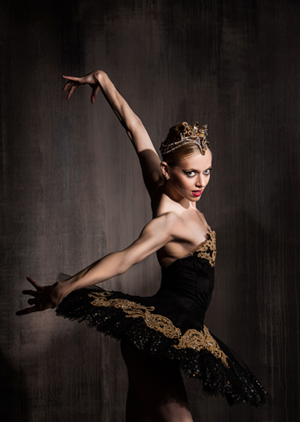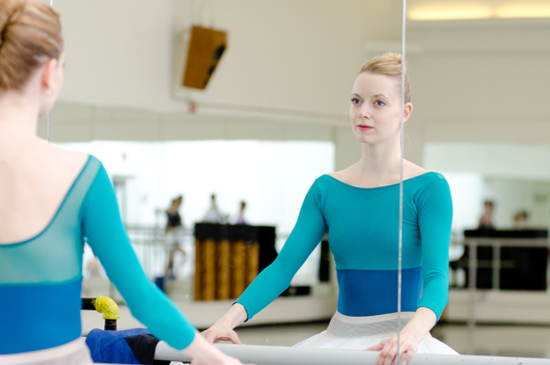My office has four walls, three of which are mirror-lined. I stare at myself wearing some combination of lycra/modal/spandex for eight hours a day, together with my 29 coworkers. We're each attempting to correctly execute steps based on set criteria, often in unison, while simultaneously dancing said steps with enough originality to be deemed "special." We each chase perfection alone, yet do it alongside one another.
This is the daily reality of a professional ballet dancer, yet you can see how this vulnerable work environment can all too easily become a breeding ground for negative thoughts. Am I fitting in? What do they think of me? Am I good enough? And our own image reflected back at us in ballet studio mirrors (or any mirrors for that matter) has a manipulative effect not unlike Plato's shadow puppets: we think we see the truth but we are really seeing a facsimile, a two-dimensional representation of reality.
Because we can't know how others perceive us - but we all yearn to be desired, loved, and accepted - we tend to make assumptions about what people think, often skewed toward the negative. This tendency is what I call The Black Swan Effect: the darkness that builds up inside of us as a result of how we think others perceive us. (Quick Primer: The Black Swan character is the archetype of evil; she's a manipulative schemer whose goal is to sway her victim toward darkness and away from light.) This insidious force creates self-doubt and fear, stifles creative expression, and is, quite frankly, unhealthy (Spoiler Alert: Ask Natalie Portman in the movie "Black Swan": she dies in the end).
We are all susceptible to some iteration of TBSE (Yep, we're giving it an acronym and treating it like an ailment) in our job, family and social life. We live in a modern society and conditioned thought is unavoidable, so we must check ourselves from time to time to make sure TBSE isn't skewing our reality. We can't pretend we're immune to external opinions, but we also cannot let fear of what people might think stifle our creative - and personal - expression.
That's why it's essential to find a strategy to override TBSE. I remember a moment years ago when I observed that the highest-ranked dancers weren't necessarily the ones with the most technical proficiency but rather those who could finesse their way past a mistake with grace and personality. Unstifled by the paralyzing grip of perfection, they just keep moving forward unapologetically and danced the next step. And it was beautiful - imperfectly unique yet more beautiful than perfection and carefulness might have been. So, I say don't get hung up on whatever your roadblock is, imagined or real. Move on with an earnest heart. Or as Taylor Swift put it..."shake it off"! Dance the next step.
 Early in my career I didn't believe I could execute 32 fouettés, the iconic and daunting feat for a ballerina, despite being a "good turner." If one little thing went awry, say around fouetté #22, it triggered the inner chatter of self-doubt, and it felt like I was sinking into quicksand. I avoided working on the problem because I didn't want to look bad - I was afraid of how people would perceive me - thus the negativity compounded: TBSE. Then, a friend suggested I change my mental focus during the fouettés by picturing a smiley face or other ridiculous image. I reticently obliged, and to my surprise that smiley face fought off the inner demons, and I finished 32 with ease! And though they weren't perfect, I was freed of my insecurities because I was giving myself a chance to move forward. And forward motion is self-perpetuating.
Early in my career I didn't believe I could execute 32 fouettés, the iconic and daunting feat for a ballerina, despite being a "good turner." If one little thing went awry, say around fouetté #22, it triggered the inner chatter of self-doubt, and it felt like I was sinking into quicksand. I avoided working on the problem because I didn't want to look bad - I was afraid of how people would perceive me - thus the negativity compounded: TBSE. Then, a friend suggested I change my mental focus during the fouettés by picturing a smiley face or other ridiculous image. I reticently obliged, and to my surprise that smiley face fought off the inner demons, and I finished 32 with ease! And though they weren't perfect, I was freed of my insecurities because I was giving myself a chance to move forward. And forward motion is self-perpetuating.
This showed me the power I had over TBSE. Maybe people did perceive me as "not good enough" when I wasn't succeeding at fouettés, but it doesn't really matter. By blocking TBSE I gave myself the opportunity to shine.
Combatting The Black Swan Effect is not a flip-of-the-switch modification; it takes practice. After years of working on "shaking it off" in the ballet studio, I now face TBSE in another arena. My business is in the middle of a crowdfunding campaign to expand its product line. Crowdfunding is arguably the ultimate modern example of shedding the fear of others' perceptions by putting yourself out there, and asking everyone you know to support your vision and (gulp) give you money to support it. But, in today's wired society to engage is to open yourself to scrutiny - to surround yourself with mirrors. Perhaps we are collectively evolving beyond the bondage of what others think.
In the end, it's unfair to presume people are as judgmental as we fear, and we should stop playing our own worst critic. The key for me with this and, really, for anyone threatened by TBSE is to proceed with a sincere heart: believing in yourself no matter what the outcome, imagining the goals you set in front of you, and shaking off the peppering of hypothetical thoughts that do not serve you. Channel your inner grace and move forward--dance the next step.
Photos by: Aimee DiAndrea (top) and Duane Rieder (right)
